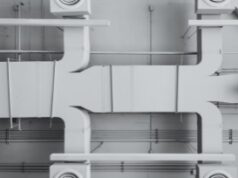 When those in the hospitality industry decide to build or remodel a hotel, significant thought and countless hours goes into planning. Rooms, restaurants, suites, health clubs, lighting, sanitation and amenities are all designed and planned from size to costs. But one thing that sadly is given less attention, and should not, is providing clean, healthy indoor air to guests and employees. We all remember what one Legionnaires’ disease event happened to a single Philadelphia hotel. The hotel and brand were tarnished and still talked about years later.
When those in the hospitality industry decide to build or remodel a hotel, significant thought and countless hours goes into planning. Rooms, restaurants, suites, health clubs, lighting, sanitation and amenities are all designed and planned from size to costs. But one thing that sadly is given less attention, and should not, is providing clean, healthy indoor air to guests and employees. We all remember what one Legionnaires’ disease event happened to a single Philadelphia hotel. The hotel and brand were tarnished and still talked about years later.
Providing clean indoor air in hotels is not a luxury. It’s becoming a necessity. In order to better compete in today’s hospitality market, hotels and hotel chains are continuously striving to differentiate themselves. One green way to achieve being different and appealing to potential customers is to provide clean quality indoor air to enhance the guest experience, promote sustainability and drive bottom line profitability.
Bi-polar clean air devices that fit into new or existing air-conditioning and heating systems remove dust particles that trigger allergic reactions, kill microbes such as mold, bacteria and viruses, break down odor producing chemicals and perceptibly improve air quality with no negative environmental effects such as ozone or noise. In short, these devices replicate fresh mountain top air, but indoors.
Why Provide Clean Indoor Air?
Clean indoor air helps your lodging brand attain sustainability and is a wonderful marketing tool. Guest complaints about indoor room air are commonplace. What if that complaint could be turned into a rave? And what if you could use healthy indoor air as a marketing inducement to gain positive attention and bring awareness to new customers? Hotel companies like Hyatt and Hilton have already joined the quality indoor air movement. Many more are following. Hotels that go green with clean indoor air also save considerable energy and money.
Typically hotels will bring in outdoor air through the heating and cooling system to maintain air quality. This air then needs to be conditioned, heated, cooled, or dehumidified. This requires HVAC systems to be bigger to address the extra load on the system, uses more energy, and costs more. The ability to reduce outdoor air by recirculating clean, purified air reduces this demand and can save significant dollars on HVAC equipment and energy costs.
Another reason to consider clean air devices is avoiding sick building syndrome. Sick building syndrome is real and common and occurs when hotel guests or employees feel ill when inside a building and immediately better when they go outdoors. And for those with allergies or asthma, poor indoor air quality can make them feel even worse.
Competitive Reasons for Providing Cleaner Air
There is a growing demand trend in the hospitality industry for competitors to provide allergy free rooms to enhance the guest experience and drive bottom line profitability. By installing a bi-polar clean air system, hotels can promote and market themselves as allergy-free to the 50 million Americans who suffer from allergies.
According to a Cornell Research Institute survey, 81 percent of travelers without allergies had a preference for an allergy-treated room. A total of 59 percent of travelers would choose a particular hotel because of allergy-free rooms. Ninety percent of business travelers expressed an interest in allergy-free hotel rooms, 82 percent of pleasure travelers expressed an interest in allergy-free rooms, and 83 percent of travelers with allergy issues had a preference for an allergy-treated room.
Numbers do not lie. Adding clean indoor air can increase reservations and help generate a healthier bottom line.
There’s another good reason to install clean air devices. Hotels that make the clean indoor air decision notice that employees are generally healthier and take far fewer sick days. Illness among front desk, restaurant or cleaning staff can cause headaches for management, and service complaints from guests. Keeping employees healthy lessens the chance that guests will experience a lapse in service.
So when you are planning a new hotel, or decide to remodel, think green, clean indoor air.
Steve Levine is president and CEO of AtmosAir Solutions of Fairfield, Conn., which installs and markets green, bio-polar air quality purification products for hotels. More information about the company is available at www.atmosair.com.







